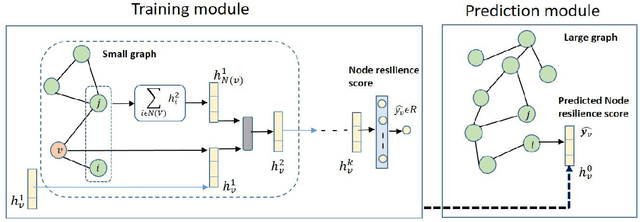Graph neural network based approximation of Node Resiliency in complex networks
Paper and Code
Dec 26, 2020



The emphasis on optimal operations and efficiency has led to increased complexity in engineered systems. This in turn increases the vulnerability of the system. However, with the increasing frequency of extreme events, resilience has now become an important consideration. Resilience quantifies the ability of the system to absorb and recover from extreme conditions. Graph theory is a widely used framework for modeling complex engineered systems to evaluate their resilience to attacks. Most existing methods in resilience analysis are based on an iterative approach that explores each node/link of a graph. These methods suffer from high computational complexity and the resulting analysis is network specific. To address these challenges, we propose a graph neural network (GNN) based framework for approximating node resilience in large complex networks. The proposed framework defines a GNN model that learns the node rank on a small representative subset of nodes. Then, the trained model can be employed to predict the ranks of unseen nodes in similar types of graphs. The scalability of the framework is demonstrated through the prediction of node ranks in real-world graphs. The proposed approach is accurate in approximating the node resilience scores and offers a significant computational advantage over conventional approaches.
 Add to Chrome
Add to Chrome Add to Firefox
Add to Firefox Add to Edge
Add to Edge